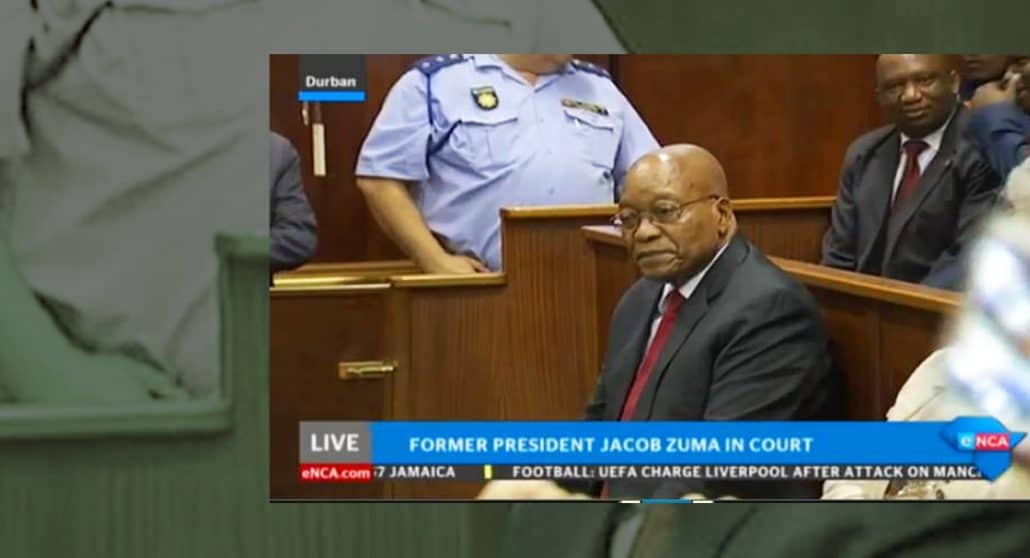Now that the inevitable can’t be put off any longer, former president Jacob Zuma is making a show of impatience for the start of his corruption trial. Zuma has been ducking and diving accountability for years in what has been referred to as a classic Stalingrad defence, but now that his options have run out, he appeared in the Pietermaritzburg High Court today for pre-trial proceedings.
The matter was postponed to 8 September, and Judge Kate Pillay cautioned Zuma to present himself on that day.
Getting to this point has not been a smooth road. Zuma has fought tooth and nail to avoid coming to trial, despite his protestations to the contrary.
The trial relates to the controversial arms deal, and stems from charges brought by the National Prosecuting Authority (NPA) against Zuma as a result of his prominence in the 2004 corruption and fraud trial of Durban businessman Schabir Shaik, Zuma’s former financial adviser. At the time of Zuma and Shaik’s business relationship, the former was the KwaZulu-Natal MEC for economic affairs and tourism. By the time he was charged, however, he was South Africa’s deputy president.
Zuma faces 16 charges, two for corruption, and the rest for fraud, money laundering and racketeering. relating to his alleged pocketing of millions linked to the 1999 arms deal. These transactions were handled by Shaik, who in 2005 was found guilty on two counts of fraud and one of corruption for taking a bribe from arms maker Thompson CSF (now Thales Group).
In late 2019 Zuma’s application for a permanent stay of prosecution in his corruption-related case was dismissed with costs, in the KwaZulu-Natal (KZN) High Court in Pietermaritzburg. A full bench ruled that Zuma, together with his co-applicant Thales, would have to stand trial.
Zuma and Thales, as expected, challenged the KZN judgment. In March this year the Supreme Court of Appeal rejected the application for leave to appeal. The applicants turned to the Constitutional Court, which in May this year dismissed Thales’ application for leave to appeal.
Zuma was scheduled to appear in court in February 2020 but, citing ill health, the former president was nowhere to be seen and Judge Pillay issued a warrant for his arrest, after expressing her suspicions about the medical certificate provided by Zuma’s lawyers.
Now there is nowhere to run, and Zuma is expected to finally have his day in court – something that he claims he has always wanted, despite the determined attempts to avoid it. During an episode of his show Zooming with Zumas, the former president said he would demonstrate that he has never “benefited from any arms deal corruption or tried to evade the trial”.
In a reversed situation, earlier this month Zuma’s lawyers, arguing in court against the state’s recent application to have his case postponed to 2021, insisted that the state was trying to cover up its failures and furthermore, that the state’s application was not accompanied by an affidavit, as was required.
“Accordingly, the application is defective and ought to be disregarded. The State seeks to obtain a long postponement without setting out the reasons on oath. It is also designed to disguise the State’s previous statements in court that it has always been ready for this trial. Through the notice it filed with this Honourable Court, the State seeks to disregard Mr Zuma’s objection to the postponement of the matter to 2021,” Zuma’s lawyers stated.
Running from the law
The NPA has been trying for years to make the charges against Zuma stick, but its own erratic handling of the case has not ensured a smooth journey to the bench. Zuma had indeed been charged after Shaik’s 2005 conviction, but in 2009, two weeks before the ballot for South Africa’s third democratically elected president – which Zuma won – the NPA suddenly dropped the charges against him in an announcement made by then national director of public prosecutions (NDPP) Mokotedi Mpshe.
Mpshe said that the decision was based on recorded conversations – the so-called spy tapes – between Leonard McCarthy and Bulelani Ngcuka, the former Scorpions and NPA heads respectively,
In them, the two men allegedly exchanged details of how the timing was imperative for bringing Zuma down politically, implying that he was a threat to then president Thabo Mbeki, and that political interference played a role in Zuma being brought to account on the corruption charges. Mbeki had removed Zuma as his deputy in 2005 after the Shaik trial.
In April 2016 the Pretoria High Court handed down a biting judgment in which it found that Mpshe’s decision was irrational and should be reviewed and set aside.
Former NDPP Shaun Abrahams announced on 16 March 2018 that the charges would be reinstated. Abrahams added that in his view, the NPA had reasonable prospects of a successful prosecution.

